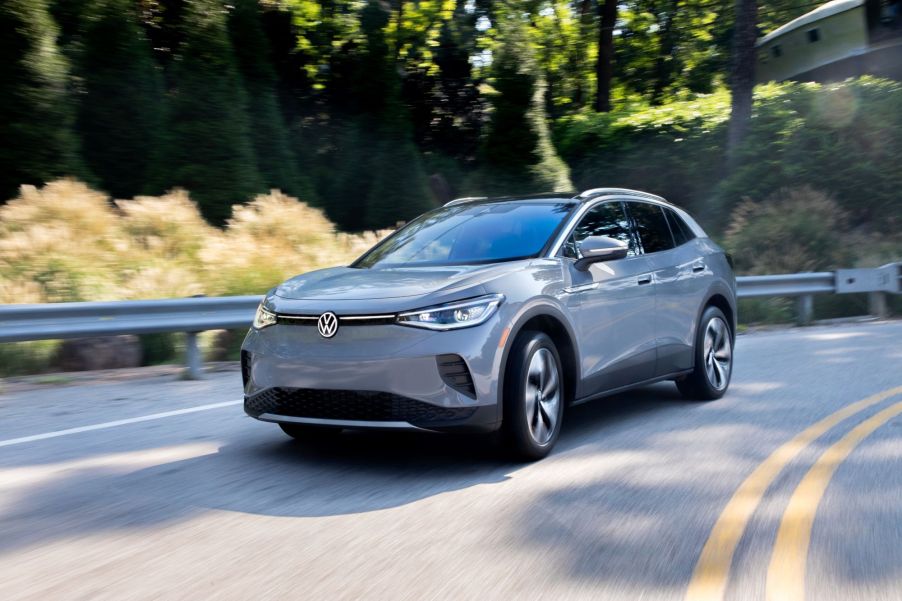
3 Reasons to Buy a 2022 Volkswagen ID.4, Not a Hyundai Ioniq 5
The EV field has grown leaps and bounds since Tesla first released the Tesla Roadster in 2008. Now most car manufacturers are battling for a piece of the electric vehicle market, with the Volkswagen ID.4 joining the fray.
Volkswagen’s offering is the 2022 Volkswagen ID.4, an affordable and reliable all-electric SUV. But how does it fare against the competition? Here are three reasons to pick and buy the ID.4 over one of its segment rivals, the 2022 Hyundai Ioniq 5.
The Volkswagen ID.4 is more affordable than the competition

Volkswagen puts the starting MSRP for the Pro, the lowest ID.4 trim level, at $41,230. This makes it a reasonably affordable option in the electric SUV market. Conversely, Hyundai’s offering, the Ioniq 5’s starting MSRP is $44,000 before the tax credit. With tax credits, it would cost you roughly $33,730 to acquire the Volkswagen, while the Hyundai costs you about $36,500.
This theme is repeated in the higher trims for the two EVs. The gap is significantly minimized in the mid-trim levels, with the Ioniq 5 SEL trim roughly $500 more expensive than the Volkswagen ID.4 Pro S.
The price gap is again extended for the top-of-the-line models from both brands. A fully loaded 2022 ID.4 will cost you almost $5000 less than the 2022 Ioniq 5 equivalent.
The Volkswagen offers more towing capacity than the Hyundai Ioniq 5
In terms of towing capacity, Edmunds notes that the ID.4 can haul 2,200 lbs of cargo while the Ioniq 5 can only pull 1,500 lbs.
The Volkswagen ID.4‘s motor produces 201 hp and 229 lb-ft of torque, while the Ioniq 5’s motor outputs 225 hp and 258 lb-ft. According to the McNally Institute, torque is typically more important than horsepower output for towing purposes. As such, the 29 lb-ft torque difference in favor of Hyundai’s electric SUV should mean it gets the edge regarding the towing capacity.
However, what actually happens is the ID.4 can pull 700 lbs more. The Ioniq 5 being lighter than the Volkswagen only makes this more confusing. It’s worth noting that the extra power in the Hyundai comes into play during acceleration, with Consumer Reports clocking its 0 to 60 mph acceleration at 1.1 seconds faster than the ID.4’s.
That said, the Volkswagen is still a better pick if you want more towing capabilities.
The Volkswagen EV can carry more cargo
The Hyundai’s dimensions imply it’s a bigger vehicle than the Volkswagen ID.4. It has a longer wheelbase at 118.1 inches compared to the Volkswagen’s 108.7 inches. Lengthwise the ID.4 is 180.5 inches, while the Hyundai is about two inches longer.
The Hyundai’s width is 74.4 inches, with its counterpart being 72.9 inches shorter. The only metric in which the Volkswagen is bigger is the height, with a 2.1-inch advantage. Therefore, the Hyundai having more interior room isn’t surprising, and this is bound to make it more comfortable.
However, the car seat placement and design seem to eat into the cargo space, so Volkswagen ends up with more room. This remains true whether the seats are upright or folded. The Volkswagen electric SUV offers 30.3 cu-ft of cargo space when the seats are up, and it goes up to 64.2 cu-ft when they’re folded.
The Ioniq 5 features a 27.2 cu-ft space with all seats in place extended to 60.2 cu-ft with them out of the way. As for the maximum payload, the two electric SUVs are more or less equal. However, if the winning aspects of Volkswagen are essential, it is the obvious choice.


